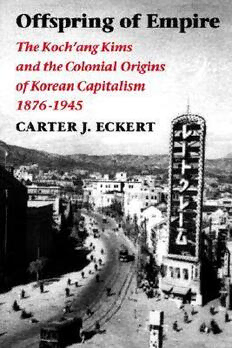
Offspring of Empire: The Koch’ang Kims and the Colonial Origins of Korean Capitalism, 1876-1945 PDF
Preview Offspring of Empire: The Koch’ang Kims and the Colonial Origins of Korean Capitalism, 1876-1945
Korean Studies of the Henry M. Jackson School of International Studies Clark W. Sorensen, Editor KOREAN STUDIES OF THE HENRY M. JACKSON SCHOOL OF INTERNATIONAL STUDIES Over the Mountains Are Mountains: Korean Peasant Households and Their Adaptations to Rapid Industrialization, by Clark W. Sorensen Cultural Nationalism in Colonial Korea, 1920-1925, by Michael Edson Robinson, with a new preface by the author Offspring of Empire: The Koch'(;mg Kims and the Colonial Origins of Korean Capitalism, 1876-1945, by Carter J. Eckert, with a new preface by the author Confucian Statecraft and Korean Institutions: Yu Hyongwon and the Late Choson Dynasty, by James B. Palais Peasant Protest and Social Change in Colonial Korea, by Gi-Wook Shin The Origins of the Choson Dynasty, by John B. Duncan Protestantism and Politics in Korea, by Chung-shin Park Marginality and Subversion in Korea: The Hong Kyongnae Rebellion of 1812, by Sun Joo Kim Building Ships, Building a Nation: Korea's Democratic Unionism under Park Chung Hee, by Hwasook Nam Japanese Assimilation Policies in Colonial Korea, 1910-1945 by Mark E. Caprio Fightingfor the Enemy: Koreans in Japan's War, 1937-1945, by Brandon Palmer Heritage Management in Korea and Japan: The Politics of Antiquity and Identity, by Hyung II Pai Wrongful Deaths: Selected Inquest Records from Nineteenth-Century Korea, compiled and translated by Sun Joo Kim and Jungwon Kim OFFSPRING OF EMPIRE The Kocnang Kims and the Colonial Origins of Korean Capitalism, 1876-1945 Carter f. Eckert With a new preface by the author University of Washington Press Seattle and London This publication was supported in part by the Korea Studies Program of the University of Washington in cooperation with the Henry M. Jackson School ofInternational Studies. © 1991 by the University of Washington Press Preface to the 2014 edition © 2014 by the University of Washington Press Printed and bound in the United States of America 17 16 15 14 5 4 3 2 1 All rights reserved. No part of this publication may be reproduced or transmitted in any form or by any means, electronic or mechanical, including photocopy, recording, or any information storage or retrieval system, without permission in writing from the publisher. University of Washington Press PO Box 50096, Seattle, WA 98145, USA www.washington.edu/uwpress Library of Congress Cataloging-in-Publication Data Eckert, Carter J. Offspring of empire: the Kocnang Kims and the colonial origins of Korean capitalism, 1876-1945/ Carter J. Eckert; with a new preface by the author. pages cm. - (Korean Studies of the Henry M. Jackson School ofInternational Studies) Includes bibliographical references and index. ISBN 978-0-295-99388-1 (pbk.: alk. paper) 1. Businesspeople-Korea-History. 2. Kim family. 3. Industrial policy-Korea-History. 4. Korea-Dependency on Japan History. 5. Capitalism-Korea-History. L Title. HC466.5.A2E25 2014 338.9519009'041-dc23 2013046770 The paper used in this publication is acid-free and meets the minimum requirements of American National Standard for Information Sciences-Permanence of Paper for Printed Library Materials, ANSI Z39.48-1984.00 For Emeline J. Eckert Contents List of Illustrations ix Preface to the First Edition xi Preface to the 2014 Edition xvii PART I: THE RISE OF KOREAN CAPITALISM 1 1. Merchants and Landlords: The Accumulation of Capital, 1876-1919 7 2. An Industrial Bourgeoisie: Transition and Emergence, 1919-45 27 PART II: THE PATTERNS OF GROWTH 65 3. Class and State: The Financial Nexus 69 4. Class and State: Partners in Management 103 5. Between Metropole and Hinterland: The Acquisition of Raw Materials and Technology 127 6. Between Metropole and Hinterland: The Quest for Markets 154 PART III: CLASS AND SOCIETY 188 7. "Without Any Trouble": Capitalist Views and Treatment of the Working Class 191 8. Class Over Nation: Naisen Ittai and the Korean Bourgeoisie 224 Conclusion: The Colonial Legacy 253 Appendix 1. Protectorate and Colonial Administrations, 1905-45 260 Appendix 2. "Dying for a Righteous Cause: The Responsibility of i/.ens Is Great" Notes 265 Guide to ROfp· Z39 Bibliography 349 Index 371 Illustrations Photographs Following page 126 The Kim family compound in Inch'on today Kim Kijung Kim Kyongjung Kim Songsu and Kim YOnsu as schoolboys in Tokyo Kim Songsu (1921) Kim Yonsu (1921) Pak YOnghyo Saito Makoto Aruga Mitsutoyo Downtown Seoul (1930s) Following page 190 The Kyongsong Spinning and Weaving Company (YOngdungp'o, 1930s) Kyongbang's board of directors (1930s) Cotton spinning at Kyongbang (1930s) Cotton weaving at Kyongbang (1930s) Calisthenics at K yongbang's South Manchurian Spinning Company (1940s) The industrial commission (1938) Sekiya Teizaburo Kim llinsu hosting Manchukuo anniversary luncheon (1942) Preparation for military conscription (Seoul, 1942) A Korean "student soldier" (hakpyong) Training and "spiritual mobilization" in the Naisen Ittai period
